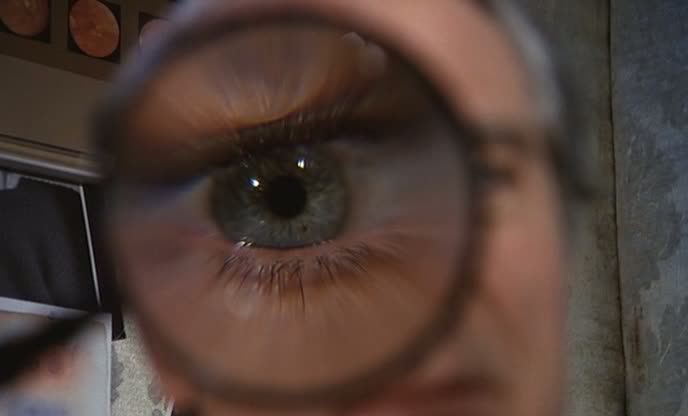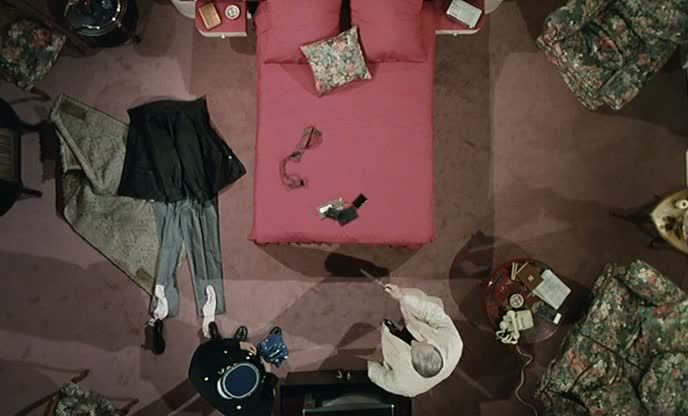

In 1985, Claude Chabrol's Cop au vin reinvigorated his career at a time when he'd been struggling and floundering. A darkly comic murder mystery set in a small town where everyone had secrets to hide, it was especially notable for the twinkly-eyed presence of the comic actor Jean Poiret, playing the cheerfully brutal and unethical Inspector Jean Lavardin, investigating a murder with wit and excessive methods. The film was such a success that Chabrol immediately followed it up with Inspector Lavardin, which as the title indicated shifted the inspector to the center of the story. There's some continuity with the first film, in that Lavardin's excessive brutality in dunking a suspect's head underwater had got him transferred even further into the country, but otherwise he seems none the worse for wear, every bit the same mischievous, wickedly clever bloodhound from the first film, digging up trouble and mystery that stretches well beyond the murder mystery that he's ostensibly solving.
Like the first Lavardin film, this one is all about ferreting out the weirdness and wickedness of the supposedly respectable, and in this it's a specifically Christian, Catholic form of hypocrisy that Lavardin's investigation is uncovering. The opening scenes, before Lavardin's arrival, introduce the respected Catholic writer and moralist Raoul Mons (Jacques Dacqmine), having a joyless lunch with his family. Mons hilariously tells his maid/cook that they're just "simple folk," that she can place the food on the table rather than serving them, which already marks him as one of Chabrol's typical comically clueless bourgeois figures. His family — wife Hélène (Bernadette Lafont), stepdaughter Véronique (Hermine Clair) and his wife's brother Claude (Jean-Claude Brialy) — doesn't seem to have any more respect for him than Chabrol does, and they take any opportunity to have some fun when he's out of the room. While Raoul's not around, Claude entertains the women with Chaplin's famous dance of the dinner rolls, and then Raoul heads off to lead a movement to ban a blasphemous play called Our Father Who Farts in Heaven.
Needless to say, this is a richly, darkly funny film, and once Lavardin arrives on the scene, his deceptively casual form of investigation only adds to the fun. He's not quite as charmingly fascistic as he was in Cop au vin, but he's still a little light on ethics, especially when it's revealed that Raoul's wife is Lavardin's former lover, and the detective promptly moves into the dead man's home. The more he investigates, the more he finds out about Raoul's hypocritical life. Chabrol really pours on the outrage: this supposed Christian is a drug dealer and user, a philanderer, and eventually it turns out, a blackmailer and rapist.


Lavardin, who's long been nursing some pain over Hélène leaving him long ago, seems less interested in the mystery, more interested in protecting Hélène and her daughter, who's named Véronique just as Lavardin had once wanted to name his own daughter, if he'd had one. He quickly becomes paternal and protecting towards the girl — who even shares the inspector's piercing blue eyes, though there's no indication she's actually his daughter — and there's a sense of yearning for family in the dogged inspector, who towards the end of the film suddenly claims that he has a family, then admits with a shrug that the photo in his wallet was not of his family but of a woman who'd killed her kids.
Chabrol brings a typically sharp visual style to this farcical murder mystery. There are numerous shots that highlight the theme of surveillance and witnessing running through the film: shots through binoculars, through the viewfinder of a camera, from a high vantage point where a hidden recording device sits, and through a magnifying glass that expands the inspector's eye to massive size, because of course he takes in everything. (That last shot is referenced in Chabrol's final film Inspector Bellamy, whose titular cop is a descendant of Lavardin.) Claude has a bizarre hobby that also relates to seeing, painting glass eyes that copy the eyes of famous people (Salvador Dali, complete with a set of eyebrows) and people he knows, like his sister. In Claude's room, surrounded with shelves on which pairs of eyeballs sit staring, raised on stalks or hidden behind masquerade masks, one can't help but feel that one is being constantly watched, but the same impression dogs the inspector and the other characters throughout the film. A pair of tabloid photographers prowl around everywhere, snapping pictures and mirroring the sneakiness of the inspector himself, who also watches from in hiding, seeing things he's not supposed to see. And in the film's final twist the mystery is solved through a surveillance video tape, a hidden eye looking down on the action and revealing the truth.
Not that Lavardin is especially interested in the truth, because as soon as he learns it, his efforts shift to covering it up, which makes the film's ending strangely hilarious and ironic. Chabrol is clearly having fun here, and though the film is concerned with the usual Chabrol theme of digging into the seedy underbelly of things, it's obviously in a much lighter context. Part of the fun is reuniting Brialy and Lafont, who'd appeared, together and separately, in some of Chabrol's earliest features, and here provide some continuity with the director's past. There's also continuity with the previous Lavardin film, especially in the inspector's obsessive breakfast habits, here indicated with his scolding of the cook for her overdone eggs. Chabrol's second outing with the clever, amoral inspector is as delightful, and as delightfully perverse, as the first.

2 comments:
In many ways Chabrol's principle subject was French provincial mendacity.It figures right at the start wiht Le Beau Serge, but that wasn't a thriller. By the time he gets to Poulet au Vinagre (aka Cop au Vin) this sort of thing is very much his meat.
I know COP AU VIN, but haven't yet seen INSPECTOR LAVARDIN to this point. But the dark humor of course is Chabrol's trademark, as is the visual stylishness. I really do need to check out the further adventures of the captivating inspector!
As always a fantastic review.
Post a Comment